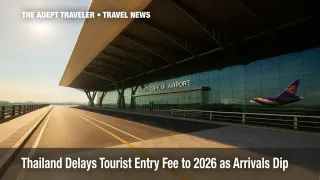Thailand Delays Tourist Entry Fee to 2026 as Arrivals Dip

Bangkok, Thailand has pushed back the debut of its controversial tourist entry levy-officially the "Kha Yeap Pan Din," or "stepping onto Thai soil" fee-by at least 12 months. The Ministry of Tourism and Sports now targets the second or third quarter of 2026, saying weak demand, a 5.6 percent drop in visitor numbers, and shaky global conditions make 2025 "the wrong moment." The delay gives officials time to study high-season traffic, finalize digital collection via the new Thailand Digital Arrival Card, and refine a tiered structure that charges {฿ 300 (THB) (approximately $ 9 USD)} for air arrivals and {฿ 150 (THB) (approximately $ 5 USD)} for land or sea. Thailand tourist entry fee delay is the latest sign of an uneven rebound in the kingdom's most important sector.
Key Points
- Why it matters: Tourism drives roughly one-fifth of Thai GDP.
- Fee postponed to Q2-Q3 2026 after four previous target shifts.
- Arrivals Jan 1-Jul 13 fell 5.62 percent y/y to 17.75 million.
- Bank of Thailand cut 2025 visitor forecast to 35 million.
- Revenue from the Thailand travel fee will fund infrastructure and basic tourist insurance.
Snapshot
The Thailand travel fee-first approved in principle by Cabinet in February 2023-is designed to capture a modest contribution from every foreign visitor. Collected automatically through airlines or at border checkpoints, it will finance visitor-insurance coverage and upgrades to tourism sites from Phuket's beaches to Bangkok's temples. Officials insist the charge is not a "tax" but a sustainability tool that mirrors programs in the Maldives, Japan, and parts of Europe. When launched, air passengers will pay the full {฿ 300}, while travelers arriving by land or sea will owe half. Multiple entries by land within 30 days will be covered by a single payment. Integration with the Thailand Digital Arrival Card aims to keep wait times flat.
Background
The idea surfaced in 2021 as Thailand grappled with pandemic fallout. Implementation dates shifted repeatedly-from April 2022 to late 2022, then 2024, and finally September 2025-largely because industry groups feared discouraging budget travelers. A brief policy reversal in mid-2024 scrapped the fee, but the new Paetongtarn administration revived it last fall, aligning it with the digital arrival-card rollout. By March 2025 officials again promised a year-end start, yet lingering demand weakness-especially from China-forced another rethink. Deputy Minister Chakrapol Tangsutthitham told reporters on July 15 that data from the coming high season will decide the final go-ahead.
Latest Developments
Thailand tourist entry fee delay dominated an otherwise grim travel-sector update on July 15.
Arrivals Slide Sparks Concern
Tourism Ministry data show 17.75 million foreign entries through July 13, down 5.62 percent year-on-year. Malaysia and China remain the top feeders, but Chinese arrivals are 18 percent below 2024 levels, hurt by safety worries and a strong baht. Airlines report load factors stuck in the mid-70s outside peak weekends.
Economic Headwinds
The Bank of Thailand's Q1 2025 Monetary Policy Report trimmed this year's visitor forecast to 35 million-still shy of the 39.8 million record set in 2019. Policymakers warn that slower tourism will shave up to 0.3 percentage points off 2025 GDP growth, already projected at a modest 2.4 percent. Hoteliers in Phuket and Pattaya report average daily rates 12 percent below pre-pandemic highs.
Industry Reaction
Trade groups such as the Thai Hotels Association applauded the pause, arguing any new cost in 2025 could tip price-sensitive travelers toward Vietnam or Malaysia. Large operators, meanwhile, back the fee's insurance component, noting that unpaid medical bills by injured tourists topped {฿ 350 million (THB) (approximately $ 10 million USD)} last year. Low-cost carriers say embedding the charge in fares will be technically simple once the collection API is finalized.
Analysis
For travelers, the decision removes an immediate extra cost and simplifies budgeting for 2025 trips. A family of four arriving by air now keeps nearly $ 40 in pocket-enough for a street-food splurge or a mid-range excursion. Advisors should flag that the reprieve is temporary; clients booking 2026 vacations can expect the fee to be rolled into tickets. Tour operators gain another year to adjust pricing and marketing. From a macro view, deferring the Thailand tourism tax trades short-term volume support for delayed infrastructure funding. Critics worry chronic under-investment in beaches, national parks, and safety services will persist. Supporters counter that a poorly timed levy could do more harm than good, especially with Chinese outbound demand still fragile. The measured approach mirrors a broader trend toward data-driven visitor-economy policy across Southeast Asia.
Final Thoughts
Travelers heading to the Land of Smiles in 2025 can bank on fee-free entry, though they should still budget for the new Digital Arrival Card and evolving visa rules. Advisors can point clients to this concise Thailand destination guide for seasonal tips and safety basics. Monitor Ministry statements around February 2026-after the next peak-season review-for the final roll-out date. Until then, enjoy Thailand's temples, beaches, and street kitchens without the extra line item, while keeping an eye on the Thailand tourist entry fee delay.
Sources
- Ministry of Tourism and Sports, Thailand. "Travel Fee Postponement Media Briefing," Facebook post, July 15 2025. https://www.facebook.com/photo.php?fbid=1151514567001876&id=100064300317042
- Bank of Thailand. Monetary Policy Report Q1 2025 (PDF). https://www.bot.or.th/content/dam/bot/documents/en/our-roles/monetary-policy/mpc-publication/monetary-policy-report/MPR_2025_Q1.pdf
- Tourism Authority of Thailand (TAT). "Cabinet Approves Cooperation Framework for 'Amazing Thailand Grand Tourism & Sports Year 2025'," Press release, May 8 2025. https://www.tatnews.org/2025/05/cabinet-approves-cooperation-framework-for-amazing-thailand-grand-tourism-sports-year-2025/
